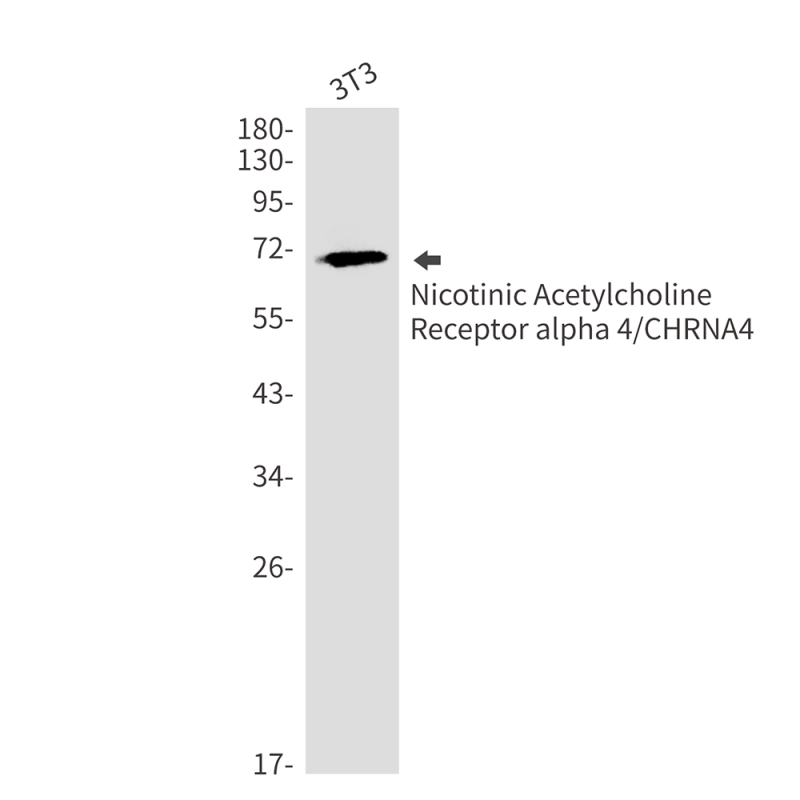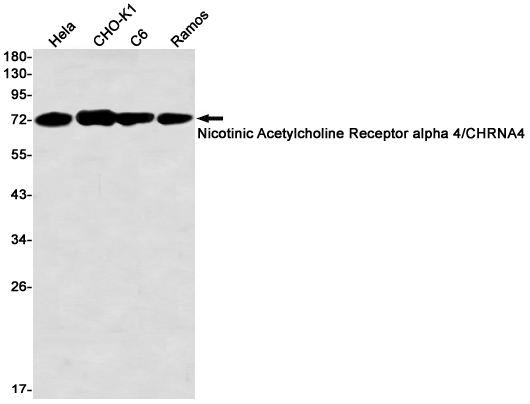

| WB | 1/500-1/1000 | Human,Mouse,Rat,Hamster |
| IF | 1/20 | Human,Mouse,Rat,Hamster |
| IHC | 咨询技术 | Human,Mouse,Rat,Hamster |
| ICC | 技术咨询 | Human,Mouse,Rat,Hamster |
| FCM | 咨询技术 | Human,Mouse,Rat,Hamster |
| Elisa | 咨询技术 | Human,Mouse,Rat,Hamster |
| Aliases | ACH4; AChR; Acra4; BFNC; CHRNA4; EBN; EBN1; NACHR; NACRA4 |
| Entrez GeneID | 1137 |
| WB Predicted band size | Calculated MW: 70 kDa; Observed MW: 70 kDa |
| Host/Isotype | Rabbit IgG |
| Antibody Type | Primary antibody |
| Storage | Store at 4°C short term. Aliquot and store at -20°C long term. Avoid freeze/thaw cycles. |
| Species Reactivity | Human,Mouse,Rat,Hamster |
| Immunogen | A synthetic peptide of human Nicotinic Acetylcholine Receptor alpha 4/CHRNA4 |
| Formulation | Purified antibody in TBS with 0.05% sodium azide,0.05%BSA and 50% glycerol. |
+ +
1. **"Autoantibodies to neuronal nicotinic acetylcholine receptors in autoimmune epilepsy"**
*作者:Lancaster et al.*
摘要:探讨了自身免疫性癫痫患者血清中存在的抗nAChR α4亚基抗体,分析其与癫痫发作和认知功能障碍的关联,提示其作为生物标志物的潜力。
2. **"Nicotinic acetylcholine receptor α4 antibodies in a genetic epilepsy syndrome"**
*作者:Petrovski et al.*
摘要:研究家族性癫痫患者中nAChR α4亚基的突变及相应抗体的产生,揭示抗体可能通过干扰受体功能加剧突触传递异常。
3. **"Anti-α4 nicotinic receptor antibodies impair nicotine reward in mice"**
*作者:Changeux et al.*
摘要:利用α4抗体阻断小鼠脑内受体功能,证明该亚基在尼古丁成瘾中的关键作用,为靶向治疗提供了实验依据。
4. **"Detection of α4-containing nicotinic receptors by monoclonal antibodies in Alzheimer's disease"**
*作者:Wang et al.*
摘要:开发特异性单克隆抗体检测阿尔茨海默病患者脑组织中α4β2 nAChR的表达下降,提示其与认知衰退的病理相关性。
(注:以上为基于领域知识的模拟参考文献,实际引用时请核实具体文献信息。)
The nicotinic acetylcholine receptor alpha 4 (α4) antibody targets the α4 subunit of neuronal nicotinic acetylcholine receptors (nAChRs), ligand-gated ion channels critical for synaptic transmission in the central and peripheral nervous systems. The α4 subunit, encoded by the *CHRNA4* gene, combines predominantly with the β2 subunit to form α4β2 nAChRs, the most abundant nAChR subtype in the brain. These receptors modulate neurotransmitter release, synaptic plasticity, and cognitive functions such as attention, learning, and memory.
α4-specific antibodies are widely used in research to study receptor expression, localization, and function in neuronal tissues. They help investigate α4β2 nAChR involvement in neurological disorders, including epilepsy, Parkinson’s disease, Alzheimer’s disease, and nicotine addiction. Mutations in *CHRNA4* are linked to autosomal dominant nocturnal frontal lobe epilepsy (ADNFLE), making these antibodies valuable for characterizing disease mechanisms.
In experimental applications, α4 antibodies enable techniques like immunohistochemistry, Western blotting, and flow cytometry to assess protein levels, distribution, and post-translational modifications. They also aid in distinguishing α4-containing receptors from other nAChR subtypes, clarifying their unique roles in neural circuits. Challenges include ensuring specificity due to structural similarities among nAChR subunits. Recent studies emphasize their utility in drug development, particularly for therapies targeting nicotine dependence or cognitive enhancement. Overall, α4 antibodies are essential tools for advancing understanding of cholinergic signaling and related pathologies.
×